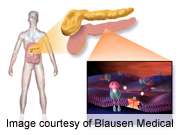In adolescents with type 1 diabetes the glucagon response to hypoglycemia is lost as early as one month and at a median of eight months after diabetes diagnosis, according to a study published online June 14 in Diabetes Care.
(HealthDay) -- In adolescents with type 1 diabetes the glucagon response to hypoglycemia is lost as early as one month and at a median of eight months after diabetes diagnosis, according to a study published online June 14 in Diabetes Care.
To investigate the glucagon response to hypoglycemia in adolescents with type 1 diabetes, Aris Siafarikas, M.D., of the Princess Margaret Hospital for Children in Perth, Australia, and colleagues conducted a study involving 28 nonobese adolescents with type 1 diabetes (median duration, 0.66 years) and 12 healthy control subjects.
The researchers found that there was a similar glucagon peak to arginine stimulation between the groups (P = 0.27). In adolescents with type 1 diabetes the glucagon peak to hypoglycemia was statistically significantly lower than in control individuals (68 versus 96 pg/mL). For 7 percent of adolescents with diabetes and 83 percent of controls this response was more than three standard deviations greater from baseline and was lost after a median duration of eight months of diabetes and as early as one month after diagnosis. The response did not correlate with height, weight, body mass index, or glycated hemoglobin.
"We conclude that adolescents with type 1 diabetes have impaired glucagon responses to hypoglycemia within 12 months of diagnosis," the authors write. "Prospective studies in children and adolescents starting from the onset of type 1 diabetes are needed to further characterize the mechanisms influencing the change over time in the glucagon response to hypoglycemia."
More information:
Abstract
Full Text (subscription or payment may be required)
Journal information: Diabetes Care
Copyright © 2012 HealthDay. All rights reserved.





















